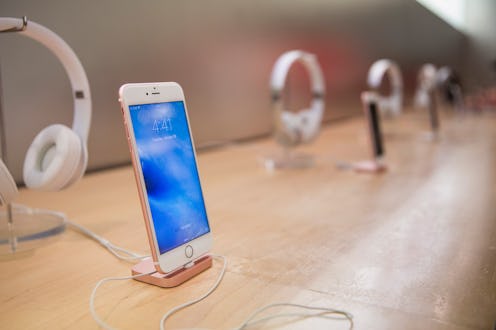News
The DOJ Has Filed A Motion Against Apple
The debate on privacy and encryption has continued to heat up after an ongoing back and forth between authorities and tech behemoth Apple. The Department of Justice has filed a motion against Apple in order for the FBI to implement firmware that would make data on the iPhone available without locking or wiping the device. So why is the FBI seeking such information? Well, it's looking into clues that a key suspect in the tragic San Bernardino shooting may have left on his phone as authorities continue to investigate the incident that left 22 injured and 14 dead.
The motion was filed on Friday, evoking the All Writs Act as a means to justify forcing Apple's compliance despite the fact that the company has issued statements protesting the request. The All Writs Act is a rather murky designation allowing a judge the power to essentially mandate that Apple do as the government says — in this case allowing for firmware installation.
Apple CEO Tim Cook laid out his concerns regarding the request in an open letter posted on the company's website on Tuesday. Cook wrote:
The implications of the government’s demands are chilling. If the government can use the All Writs Act to make it easier to unlock your iPhone, it would have the power to reach into anyone’s device to capture their data. The government could extend this breach of privacy and demand that Apple build surveillance software to intercept your messages, access your health records or financial data, track your location, or even access your phone’s microphone or camera without your knowledge.
The firmware that the FBI has requested to install on the device would allow for an unlimited amount of password combinations to be tried in order to access information on suspect Syed Rizwan Farook's iPhones. Farook was issued an iPhone for work and authorities believe that key information regarding the shooting may be among what they can cull from the device, including potential correspondences to fellow suspects.
Apple is worried abuse of power that such a fulfilled request may bring, insinuating that the government would instead be compelled to use its firmware to monitor regular citizens rather than sticking this specific case. The DOJ has called foul, citing information on the company's website regarding government information requests. Apple had stated that it would "never allow any government access" to company servers.
The motion reads as follows:
Based on Apple's recent public statement and other statements by Apple, Apple's current refusal to comply with the Court's Order, despite the technical feasibility of doing so, instead appears to be based on its concern for its business model and public brand marketing strategy.
The Department of Justice is currently seeking a court order that would compel Apple to comply. Its motion was drafted on Tuesday and certified on Friday in Riverside, California — the neighboring community to San Bernardino and location of the state's Central District Court. It's unclear what will happen next between authorities and Apple until a judgment is rendered.
